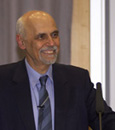
Fotis C. Kafatos.
Monday, 26 May 2008, 18:00 Print Media Academy, Kurfürstenanlage 52-60, Heidelberg
Mit freundlicher Unterstützung der Manfred Lautenschläger Stiftung
Prof. Fotis C. Kafatos
Prof. Fotis C. Kafatos, President of the European Research Council and Professor at the Imperial College, London
Malaria: A Challenge for Humanity and Science
Malaria is a leading cause of suffering and death in the developing world, with more than a million deaths per year, mostly of children under the age of five. It is a disease of poverty, most obvious in sub-Saharan Africa but also intense in South Asia (e.g. the poor regions of India) and in South America. A recent concerted effort supported by both philanthropy and governmental agencies has begun to have some impact, and the Gates Foundation has declared its determination to lead an effort to eradicate the disease. However, progress towards effectively addressing this social challenge can be expected to be slow, requiring sustained and innovative efforts over many decades.
The malaria challenge to science is equally daunting. We now have essential genomic information for all three organisms implicated in this disease: the Plasmodium parasite (the causative agent), the human (the host) and some Anopheles mosquito species (the vectors). Much remains to be learned - for example the basis of differential susceptibility or resistance in some human population and the genetic and molecular interactions between parasites and vectors that determine to a major extent the outcome of infected mosquito bites of humans. Efforts to develop vaccines, drugs and novel interventions are ongoing, and examples will be discussed in the lecture.
Professor Fotis C. Kafatos was born in Crete, Greece, where he received his primary and secondary education. He graduated from Cornell University (1961) with a bachelor's degree with high honours and went on to earn masters and doctorate degrees (1965) in biology from Harvard. There he joined the faculty in 1965 and was a full Professor from 1969 to 1994. In parallel, he served part-time as Professor of Biology at the University of Athens from 1972 to 1982, Founder and Director of the Institute of Molecular Biology and Biotechnology (IMBB) at the Research Centre of Crete and Professor of Biology at the University of Crete from 1982 to 1993 (since then on leave). From 1993 till April 2005, Professor Kafatos was Director General of the European Molecular Biology Laboratory (EMBL), the top leading molecular biology laboratory in Europe. In June 2005, he joined Imperial College London as Professor of Immunogenomics. Recently he was appointed as one of the 21 founding members of the Scientific Council of the new European Research Council.
Prof. Kafatos is a distinguished scientist of international repute, based on major scientific contributions. He was an early leader in bringing molecular approaches to the study of development, and one of the inventors of cDNA cloning, that has been critical to modern biology. He used this technology in pioneering analyses of the molecular evolution of gene families, including the first demonstration of conserved developmental regulatory elements between distant animals (silkmoth and fruitfly). He was the initiator of the Drosophila genome project and in the last decade has helped change the field of malaria research beyond recognition, by using molecular approaches to understand the interactions between the Anopheles mosquito and the Plasmodium parasite. He helped coordinate the Anopheles genome sequencing project and led its subsequent utilisation in functional genomic analyses, focusing on the molecular physiology of infection and mosquito innate immune responses to the parasite. He had a major influence in the development of molecular biology in Greece, at the Universities of Athens and Crete and at the IMBB, and through facilitating the studies of young Greek scientists abroad. He is active in efforts to promote research in the scientifically less privileged parts in Europe and in the developing world, working with the WHO and the Bill and Melinda Gates Foundation (where he has served as a member of the Scientific Advisory Board for the Grand Challenges Program).